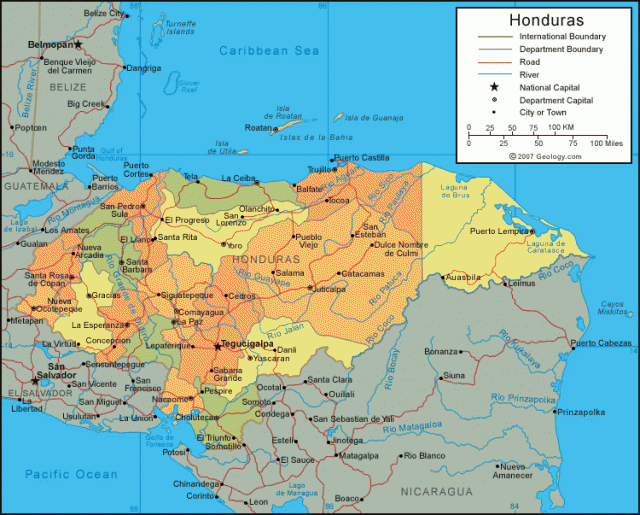Honduras
Area 43,278 square mi (112,090 square km)
Population 6,669,789
Capital Tegucigalpa
Highest Point 9,416 ft (2,870 m)
Lowest Point 0 m
GDP per capita $2,600
Primary Natural Resources timber, gold, silver, copper, lead, zinc.
Honduras is located right in the heart of Central America, sharing borders with EL SALVADOR, NICARAGUA, and GUATEMALA. Most of the people are considered mestizos, or of a mixed heritage of white and Amerindian. The country's area includes the three Caribbean islands ceded to the country by the UNITED STATES in 1971, Roatan, Utila, and Guaranja. Honduras's topography is varied, with mostly highlands through the central part of the country, flanked by coastal, tropical coasts. Currently, 7.7 percent of the country is preserved by the government, and includes tropical rainforest and fragile coastland. Education at the primary level is free and compulsory; the literacy rate for both men and women is about 30 percent. Healthcare is very poor, and conditions are some of the worst in the Western Hemisphere. The life expectancy is about 67 years old.

Like its neighbors, Honduras possesses an enormous amount of natural resources in its rainforests and coastline. One of the most precious of these resources, and also the source of notorious conflicts with Nicaragua, is the Miskito coast of the southern portion of the Honduran Caribbean coast. This preserved forest, which is home to the Miskito indigenous group, is under partial jurisdiction of the Honduran government. Home to thousands of fish and bird species, this untouched “biogem” presents an opportunity for the country to develop sustainable tourism in its lesser developed regions.
Another natural resource of Honduras, and likewise a source of contention with its neighbors, is the Gulf of Fonseca, which is located on the western coast. El Salvador and Nicaragua also share a border with this gulf, creating a dynamic of competition and culpability for aquaculture and pollution. Shrimp farming has proliferated in the gulf, creating environmental degradation for native wild species as well as tremendous coastal development. Since three countries share the gulf, conflicts often arise when fishing harvests are diminished; addressing problems of over-fishing and water pollution to alleviate small harvests becomes a game of finger pointing.
Political life in Honduras has been tenuous and complex. Original settlements of the warlike Lencas and Jicaques were taken over by Spanish colonizing forces in 1524. Despite declaring its independence in 1838, Honduras's government has still suffered economic and political forces, such as America's United Fruit Company, that lie outside its boundaries. United Fruit Company had a long presence in the Caribbean and was notorious for its enslaving conditions of Honduran workers whose lands were monopolized and whose livelihoods were at the mercy of the huge corporation. The company has since left the country and been broken up, but present-day fruit distributors, like Dole and Del Monte, provide hauntingly familiar dynamics between their mass production and local communities.